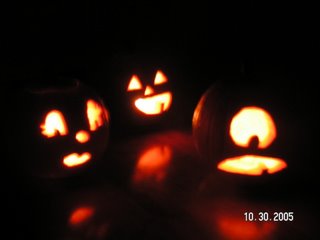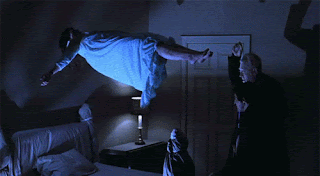
Keep back! They might be fun!
We could take this as proof the Catholic church is hardly the monolith so many like to portray it as:
Halloween is the night of satanic sacrifices and witch spells. I know this for a fact from hearing it from a wiccan’s mouth. Eight years ago, I was on retreat with all the priest from my diocese at San Damiano Retreat house in Danville California. I was praying before the Blessed Sacrament in their chapel when a group of people came in. I knew it would not be good because earlier I had seen them dancing around the peace pole. It was an ecumenical group (with a catholic Franciscan priest whom I know personally). That year their motto was “opening the circle”. To my horror as I knelt praying, the witch began a guided meditation. I remember very well when she said; “On Halloween we witches burn away the old and begin all things new.” I reported this to our bishop and the staff at the retreat center. I should have stopped them and kicked them out of the chapel, but I am a coward and will pay for it after I die. I also reported it to the Bishop of Oakland.Because according to New Advent, Halloween is the vigil of All Saint's Day. According to American Catholic:
The true origins of Halloween lie with the ancient Celtic tribes who lived in Ireland, Scotland, Wales and Brittany. For the Celts, November 1 marked the beginning of a new year and the coming of winter. The night before the new year, they celebrated the festival of Samhain, Lord of the Dead. During this festival, Celts believed the souls of the dead, including ghosts, goblins and witches, returned to mingle with the living. In order to scare away the evil spirits, people would wear masks and light bonfires.
When the Romans conquered the Celts, they added their own touches to the Samhain festival, such as making centerpieces out of apples and nuts for Pomona, the Roman goddess of the orchards. The Romans also bobbed for apples and drank cider, traditions which may sound familiar to you. But where does the Christian aspect of the holiday come into play? In 835, Pope Gregory IV moved the celebration for all the martyrs (later all saints) from May 13 to November 1. The night before became known as All Hallow's
Even or holy evening. Eventually the name was shortened to the current Halloween. On November 2, the Church celebrates All Souls Day.
The purpose of these feasts is to remember those who have died, whether they are officially recognized by the Church as saints or not. It is a celebration of the communion of saints, which reminds us that the Church is not bound by space or time.
Of course that's not Mexico, and maybe it has to do with being American Catholics. The French, who used to be almost all Catholics, never really took up with it (although we should have taken their Feast of Fools; that would still be cool; sadly, American Halloween is as close as we come anymore.) Wikipedia, for what that is worth, tells me that Neopagans and Wiccans have claimed the holiday as theirs since the mid-20th century, which to me is kind of like saying the "peace symbol" is an ancient symbol of the Anti-Christ that just happened to have been invented in the 1950's in Britain (has anyone checked the Queen to be sure she doesn't bear the mark of the Beast?)
Anyway, this is supposedly the time of year when the dear departed can return to walk the earth and communicate with us. There was a time when the recently departed were kept at home until burial, and somebody sat up with them because it was unkind to leave the dead alone. Now we keep them as far from us as possible, in places we never visit unless we have to; so I guess it's logical we'd fear the possibility of their return, rather than find it comforting. Or we'd find child's play to be threatening because...well, because.
The dead return only once a year. The derp, unfortunately, is always with us.
So it goes.
Because: why not?

I used to love Halloween when it was a totally home-made holiday, no store bought "Halloween lights" and the revolting holiday of corn syrup and hydrogenated soy oil. Now it's just awful. I think, if it had a lower sugar content, I'd prefer dia de los muertos/
ReplyDeleteThere was the French Canadian story that if you were out reveling on the 31st that you ran the danger of encountering the feu follet. I wish I could find an English translation of the legend of the newly weds who held a dance party and who barely made it home after midnight without more than singed heels on their boots. Of course the "Sceptiques du Quebec" are being kill joys over it.
I'm not as attracted by the dark as I once was, I prefer November 1st now. It always reminds me of the contrast made in Antonia Fraser's Quiet as a Nun between the light of that mass and the somber All Souls Day mass the next day.
Superstition is ridiculous, no matter its source.
ReplyDelete